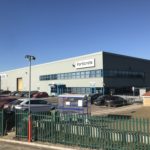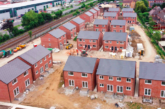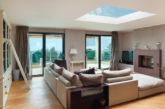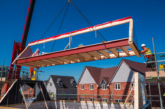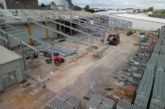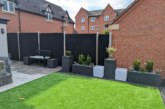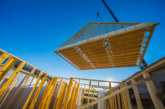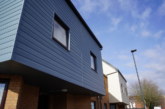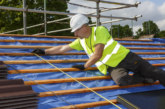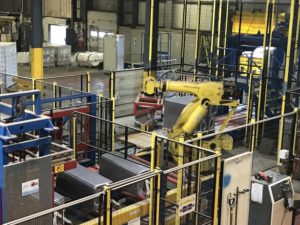 With a large range of roof tiles, cast stone, walling stone and architectural masonry, Forticrete is well-placed to help housebuilders make the build process quicker and more cost effective.
With a large range of roof tiles, cast stone, walling stone and architectural masonry, Forticrete is well-placed to help housebuilders make the build process quicker and more cost effective.
With long lead times for the most popular building materials a familiar story, it is unsurprising that research from the Federation of Master Builders (FMB) indicates that a third of firms are recommending the use of different materials to those originally specified. One company well placed to help housebuilders and developers seeking to use alternative products – that recreate the look of traditional materials without compromising on quality – is Forticrete.
Part of Ibstock plc, Forticrete is a leading manufacturer of concrete building products. It has a large range of roof tiles, cast stone, walling stone and architectural masonry which has evolved over five decades through close collaboration with its customers in the construction industry.
Managing Director John Lambert commented: “By analysing the needs of an ever-changing market and adding our own considerable technical expertise we have developed products that provide an optimum balance of aesthetics, performance and value. Not only does this ensure housebuilders attempting to address the housing shortage have the products they need, but so too do the architects looking to ensure their projects enhance the visual appeal of the built environment.”
Forticrete has seven manufacturing sites across the country, providing nationwide coverage. Anticipating the growth in demand for its products, it has invested consistently over the last decade bringing additional capacity to the market. Lambert said: “Our sites blend traditional manufacturing methods with a highly skilled workforce and the most modern technology and machinery to create high quality, highly sustainable products.”
The company has long been at the forefront of innovation. Lambert explained: “When we design a product, we do so with ease of use in mind. It is an important focus for product development given the current, and well documented skills shortage in the construction sector.”
And its reputation has widely been recognised. As an example, Forticrete’s Gemini concrete roofing tile was awarded the prestigious Millennium Products status by the Design Council and was subsequently honoured by a Queen’s Award for Enterprise: Innovation.
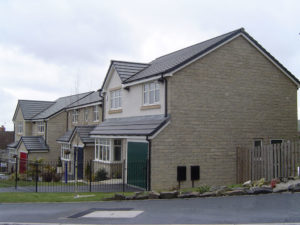 Go large
Go large
Lewis Turnbull, Forticrete’s Technical Advisor, said: “SL8 has dimensions more akin to traditional natural slate products, which provides an enhanced aesthetic. Added to this is the extremely thin leading edge which makes the product even more attractive to housebuilders and developers. With approximately 20% less tiles required per roof, the tiles are quicker and easier to lay, handle and transport. With less product required, the potential for damage on site and waste in the manufacturing process is also reduced, resulting in cost and time savings. And whilst it offers a more cost-effective solution, like all of our products, it doesn’t compromise on aesthetics.”
Wall aboard
Aside from its concrete roof tiles, Forticrete’s walling is also increasing in popularity. Lambert said: “We are seeing sales of Shearstone Walling increase across many regional hotspots, such as the Cotswolds, Oxfordshire and Gloucestershire, as it replicates the look of natural stone walls that have historically been built across the south west of the country. Specific examples of this are the Light Ham of Somerset and the Buff of the Costwolds which are excellent examples of stone types admirably mirrored in the Shearstone range. It’s popularity with builders is growing as it suits the local vernacular and is also a viable alternative to brick. Cast stone products are also selling well as architects and specifiers seek to achieve a high-end finish to enhance the visual appeal of the built environment on housing schemes both small and large.”
As an environmentally conscious company, and in line with other companies within Ibstock plc, Forticrete recognises the impact of its operations. By considering the environmental aspects of its production, the company is directed towards a cleaner, safer and healthier environment.
Lambert said: “As well as their durability, our products are also more sustainable during the manufacturing process. Plain tiles use 75kg of raw materials per square meter in the manufacturing process, whereas our Gemini tile uses 45 Kg of raw material per square meter. This reduces the CO2 emissions created from the manufacturing process, transportation of the raw materials and finished goods to site by up to 40%. Using less raw materials means our natural resources that are essential for future generations are preserved for much longer.
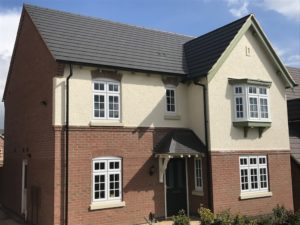 “As a company we have taken progressive steps to improve waste management for the benefit of the environment. We are committed to sustainable manufacturing and this is demonstrated by our compliance to the updated version of ISO14001. Our production processes are continually evolving, with sustainability and a commitment to the circular economy at the heart of our strategy. All of Forticrete process waste is 100% recycled either by ourselves into the manufacturing process or externally processed and recycled into secondary aggregates or hardcore – none of our process waste goes to landfill.
“As a company we have taken progressive steps to improve waste management for the benefit of the environment. We are committed to sustainable manufacturing and this is demonstrated by our compliance to the updated version of ISO14001. Our production processes are continually evolving, with sustainability and a commitment to the circular economy at the heart of our strategy. All of Forticrete process waste is 100% recycled either by ourselves into the manufacturing process or externally processed and recycled into secondary aggregates or hardcore – none of our process waste goes to landfill.
John Lambert concluded that the key to Forticrete’s growth is as a result of housebuilders and developers embracing methods which make the build process quicker and more cost effective. He added: “Materials that offer sustainable, cost-effective alternatives and a guarantee to stand the test of time provide a win-win for everyone in the supply chain. And Forticrete is well placed to be a part of this success.”

